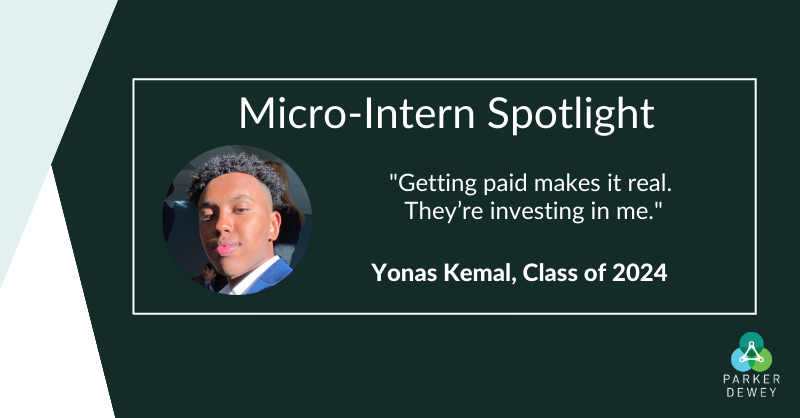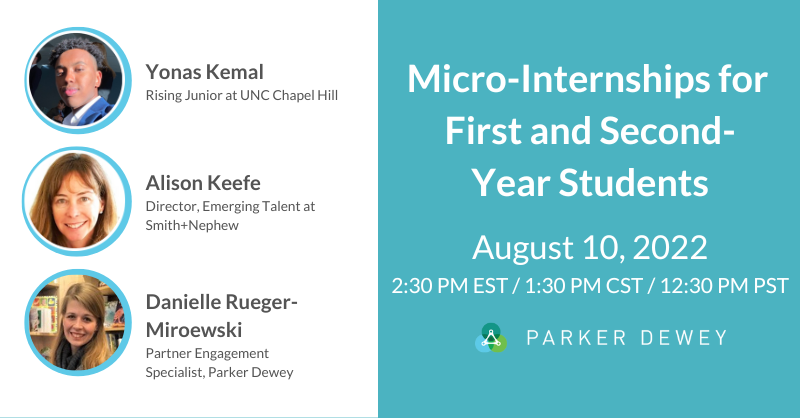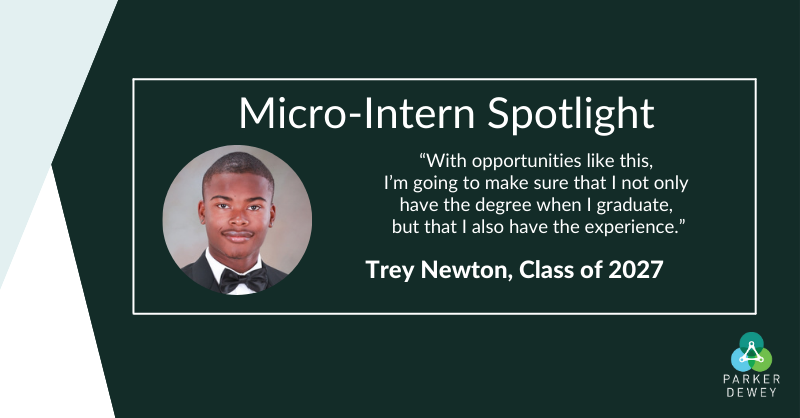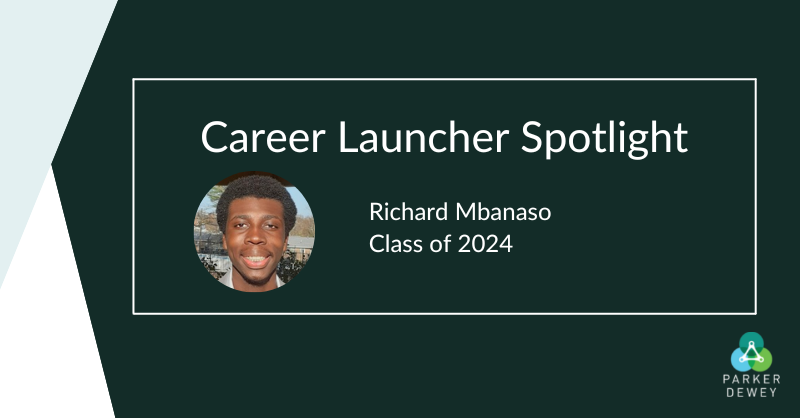
Micro-Intern Success: Exposure, Exploration, and Experience
Yonas Kemal, a Business Administration and Public Policy major at University of North Carolina Chapel Hill, has never been one to shy away from new experiences. As an ambitious student with a variety of interests, Yonas knew he needed exposure to a range of professional paths to help him define his goals. As early as his sophomore year, Micro-Internships began helping him do just that.
An Early StartDespite being a first-generation student, Yonas started UNC Chapel Hill familiar with the idea of the ‘traditional’ path. From what he’d observed, you study your first and second year, land your big internship your third year, and then maybe try to get a return offer.
For Yonas, who will be starting his junior year this fall, waiting to get exposure to the professional world didn’t feel like an option. He explained, “Right when I got into college, I threw away the age question. Unless an opportunity had a specific age or grade requirement, I did as much as I could to expose myself to a variety of industries and possibilities. Yes, it’s work, but it’s also fun to get hands-on with it. It’s another form of learning.”
This is why, when Yonas learned about Parker Dewey Micro-Internships, he didn’t let his Sophomore status cause even a moment of hesitation.
Micro-Internships for First and Second-Year Students
Yonas shared that the paid, short-term, professional projects available through Parker Dewey were described to him as a great opportunity to get exposure in a unique way. When Yonas got wind of the concept, he thought, “This is amazing, why haven’t I heard of this before?” He explained his enthusiasm, saying, “During school, you might only have a limited number of hours a week. Some companies might offer off-cycle internships, but they’re few and far between”. Yonas also expanded on the accessibility and appeal that comes from the projects being paid.
“Time is money. Especially when you’re a student, you’re always strapped with classes, clubs, and organizations - There’s a million things going on. If you’re taking time out of your day to learn, expose yourself, and add value to a firm, it’s only right that the firm also compensates you for that.”
Not only does the paid nature of Micro-Internships make them viable opportunities for those who couldn’t otherwise afford the time to work on the projects, but, as Yonas pointed out, being paid also adds another level of responsibility to the experiences that can be hard for first and second-year students to come by. He explained, “Getting paid makes it real. They’re investing in me and I have the responsibility to deliver a quality project. If someone’s paying me money, I take that seriously.”
Having had two Parker Dewey Micro-Internship experiences as a sophomore, Yonas appreciated being able to use these smaller projects as a way to further build his networking skills. He shared, “This is a great stepping stone to building those relationships. The earlier you can practice building and maintaining relationships and even building personal relationships the better - those skills are critical”.
Yonas’s Micro-Internship supervisors have played a substantial role in making his Micro-Internships valuable learning experiences. Yonas explained how his supervisors have helped him achieve his goal of being exposed to new industries and roles.
“Everyone’s been extremely open, understanding, and flexible. They’ve been willing to give me exposure, answer questions, and be a resource outside the role itself. That experience also speaks to the types of companies and managers that are using Parker Dewey.”
Yonas reflected on the relationship he built with one of his Micro-Internship supervisors in particular, saying, “I still keep in contact with [my supervisor]. I liked a lot about the company and their mission and how I aligned with it, and I wouldn’t have had that exposure without Parker Dewey.”
Efficient Career Exploration
Thanks to his hard work and the skills he built through his Micro-Internships, classes, and extracurricular activities, this summer Yonas has landed a traditional internship at a multinational technology conglomerate corporation. He shared some of the differences he’s noticed between Micro-Internships and his current experience, describing the traditional internship as “50% projects and hands-on work, 50% programming and exposure to the company”. By comparison, Yonas said, Micro-Internships are more “rapid-fire”.
In Yonas’s words, Micro-Internships are more of a ‘choose your own adventure’. He shared, “Here at my summer internship, I have weekly meetings. With Parker Dewey Micro-Internships, those weekly meetings are about the specific project, but there’s still a level of flexibility to ask additional questions. You can do your work and log off, or you can keep going down the rabbit hole to learn more and maybe even set yourself up for future opportunities with that company.”
That level of flexibility and efficiency was especially appealing to Yonas as a student who was still early in his college career, as it allowed him to quickly get an idea of what he liked, and even what he didn’t. Yonas explained the benefits of even a Micro-Internship that isn’t an ideal fit, saying, “At the end of the day, you may not want to go down that road, but it’s great to have that information too.”
Advice
When asked if he had any advice for companies about Micro-Internships, Yonas’s quick response was ‘do them!’.
After some additional thought, he expanded, “it’s a great way to access new pools of talent with a fantastic ROI in terms of time, money, etc”. Yonas is also well aware of the ups and downs the labor market has seen in the past few years, and added, “It’s times like this is when you need to lean in to trying something new.”
Yonas, who mentors freshmen at UNC Chapel Hill, has already started spreading the word about Parker Dewey to his mentees. He urges his fellow students, “Every semester, be involved in clubs, do Micro-Internships, etc. What happens outside of the classroom is just as important as what happens in.” He went on to say, “The two months you spend on a project, you might learn just as much if not more than you might learn from taking a course.”
Want to learn more about how Micro-Internships can serve as a Career Exploration tool for first and second-year students while helping companies develop their talent pipeline? Register for our upcoming webinar!




